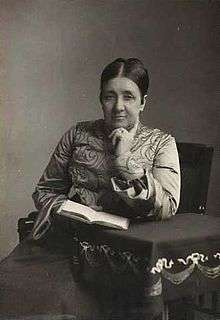Astrid Stampe Feddersen
Astrid Stampe Feddersen, usually known as Astrid Stampe, (born Baroness Stampe; 19 December 1852 – 16 April 1930) was a Danish women's rights activist and sister of Rigmor Stampe Bendix. Stampe joined the women's movement early on. From 1883 to 1887, she was on the board of Danish Women's Society, playing an active part in work on women's issues. She authored Kvindesagen (1886, second edition 1907)[1] and Kan Kvindesagen og Sædelighedssagen skilles ad? (1888).[2] She was the daughter of Henrik Stampe (1821–1892). Her great grandfather is Jonas Collin who was Hans Christian Andersen’s fatherly benefactor[3].

Biography
Born at Christinelund near Vordingborg, Stampe was of noble ancestry. Her personal tutors, her upbringing in Copenhagen and her educational travels gave her a cultured background. She learnt Swedish, French and English but not German as a result of the Schleswig wars. Her husband Gustav Feddersen supported her feminist interests and her membership of the Copenhagen chapter of the Danish Women's Society from 1882. She successfully sought to reinforce the association's position and extend its influence to the provinces.[4]
Stampe took part in the fight against prostitution and fought for greater equality between men and women, including unmarried women.[5] From 1895, she helped to create regional support for her ideas in Ringkøbing and Holstebro. In 1903, she was elected to the board of Dansk Kvindesamfund, later becoming its vice-president.[4][6] In 1906, Stampe helped prepare a bill to provide significant improvements to the rights of unmarried mothers and their children while in 1914 she chaired the first Scandinavian meeting on women's rights. In 1916, she also supported the cause of women in Iceland as co-founder of the Danish-Icelandic Society.[7]
References
- Stampe, Astrid (1887). Kvindesagen: En kortfattet redegørelse.
- Stampe, Astrid (1888). Kan kvindesagen og sædelighedssagen skilles ad?.
- [andersen.museum.odense.dk/billedboeger/stampe.asp?language=en Astrid Stampe’s Picture Book 1853]Odense City Museum
- Tinne Vammen. "Astrid Stampe Feddersen (1852–1930)" (in Danish). Dansk kvindebiografisk leksikon. Retrieved 1 April 2014.
- Fink, Janet; Lundqvist, Åsa (2010). Changing Relations of Welfare: Family, Gender and Migration in Britain and Scandinavia. Ashgate Publishing, Ltd. p. 44. ISBN 978-0-7546-7893-9.
- Melby, Kari; Ravn, Anna-Birte; Wetterberg, Christina Carlsson (2009). Gender Equality and Welfare Politics in Scandinavia: The Limits of Political Ambition?. The Policy Press. p. 18. ISBN 978-1-84742-465-5.
- "Astrid Stampe" (in Danish). Dansk Biografisk Leksikon. Retrieved 1 April 2014.
Further reading
- Stampe-Feddersen, Astrid, Nordisk familjebok (2nd edition, 1917), in Swedish
- Stampe Feddersen, Astrid, Christian Blangstrup, Salmonsens Konversationsleksikon (2nd edition, 1927), in Danish